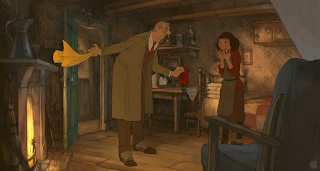
The film isn't totally Chomet's. In some ways it is a (phantom) collaboration between Chomet and famed French filmmaker Jacques Tati (1907-1982). Tati, who directed only six features during his life, is best known for his nearly wordless comedies staring his alter-ego, the innocently-incompetent Mr. Hulot. The Illusionist is adapted from an un-produced screenplay by Tati, said to be written as a response to his estranged eldest daughter.

The movie takes place for the most part all around the United Kingdom, with locations in London, Scotland, and a majority spent in Edinburgh (also the location of Chomet's studio where the film was produced). The time of the movie isn't established, although it can considered somewhere around the late 50's and early 60's. The main character, Tatischeff (Tati's birth name), is an aging magician who finds interest for his talents dwindling, and is short on venues to perform his magic act. One of his luckier ventures into Scotland introduce him to an impressed young waitress. After some confusion, she winds up in his lap, and he ends up taking care of her, like a father figure. The rest of the film shows the girl growing up emotionally, while Tatischeff slowly comes to the realization that he needs to rethink his life.

I have to say, the film is more of a thematic essay than a thorough story. But I might be far reaching. It seems like it is trying to be a clear story, but the relationship between the magician and the girl doesn't start off very clearly. Because there is hardly any dialog, the audience has to pay close attention to the acting and pantomime in order to realize the characters' developments. I had some trouble there.

One of my favorite characters is a pudgy white rabbit with an irate temper and a need to bite. The rabbit is added for comedic effect, as Tatischeff has a difficult time controlling his live prop before and after shows.

The character designs are great, although not as fantastical as in Triplets. While the characters in Triplets were like bizarre caricatures, the characters in The Illusionist are much softer in terms of exaggeration. They are not scary looking, and are a little more realistic. Tatischeff is an obvious caricature of Jacques Tati, but in a friendly way.

The art direction of the film is beautiful. The majority is done by hand, drawn and painted with watercolors. Like the character designs, the art direction is only slightly exaggerated, as the location are quite precise. Some shots still require digital assistance, but they are wonderfully composed shots.

Some shots, however, get a little too crowded. Too many characters in one shot, and a lot of faces to catch. Actually, this may give the film some staying power. The more it is watched, the more details one can pick up on. However, considering how tricky the story is, that remains to be seen.

I am very willing to see this film again. This review is after only one viewing, and likely to change after several more viewings. For now, I am still very impressed by Sylvain Chomet's talents as a director and artist, and it is a good film. I just feel the storytelling needs work. It is not easy to replicate a writing style, especially Jacques Tati's style, which was very unique and distinctive. However, I can see Tati's influence in Triplets as well, so the influence is clearly there. I hope Chomet has a few more films up his sleeve. At the very least, his complexities may allow him as many films as Tati produced in his lifetime.

No comments:
Post a Comment